THE
-
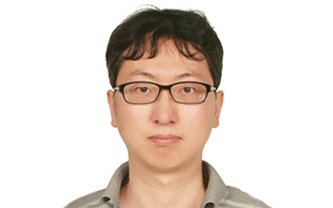 Professor Lee Recognized by the KMS as Best Paper Awardee
Professor Ji Oon Lee of the Department of Mathematical Sciences was selected as the 2017 Best Paper Awardee by the Korean Mathematical Society. The award will be presented during the KMS spring meeting on April 29. Dr. Lee is being honored for proving a necessary and sufficient condition for the Tracy-Wisdom law of Wigner matrices. In a paper titled ‘A Necessary and Sufficient Condition for Edge Universality of Wigner Matrices,’ he proposed a solution for one of the many unanswered problems in the field of random matrix theory that have existed for decades. The paper, co-authored with Professor Jun Yin at the University of Wisconsin – Madison, was published in the Duke Mathematical Journal in 2014. Professor Lee joined KAIST in 2010 after finishing his Ph.D. at Harvard University. He was named a ‘POSCI Science Fellow’ and received the ‘Young Scientist Award’ from the KMS in 2014.
2017.04.27 View 10983
Professor Lee Recognized by the KMS as Best Paper Awardee
Professor Ji Oon Lee of the Department of Mathematical Sciences was selected as the 2017 Best Paper Awardee by the Korean Mathematical Society. The award will be presented during the KMS spring meeting on April 29. Dr. Lee is being honored for proving a necessary and sufficient condition for the Tracy-Wisdom law of Wigner matrices. In a paper titled ‘A Necessary and Sufficient Condition for Edge Universality of Wigner Matrices,’ he proposed a solution for one of the many unanswered problems in the field of random matrix theory that have existed for decades. The paper, co-authored with Professor Jun Yin at the University of Wisconsin – Madison, was published in the Duke Mathematical Journal in 2014. Professor Lee joined KAIST in 2010 after finishing his Ph.D. at Harvard University. He was named a ‘POSCI Science Fellow’ and received the ‘Young Scientist Award’ from the KMS in 2014.
2017.04.27 View 10983 -
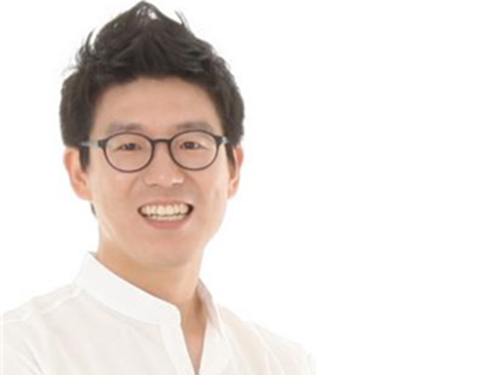 Professor Jae Kyoung Kim Receives the 2017 HSFP Award
The Human Frontier Science Program (HSFP), one of the most competitive research grants in life sciences, has funded researchers worldwide across and beyond the field since 1990. Each year, the program selects a handful of recipients who push the envelope of basic research in biology to bring breakthroughs from novel approaches. Among its 7,000 recipients thus far, 26 scientists have received the Nobel Prize. For that reason, HSFP grants are often referred to as “Nobel Prize Grants.”
Professor Jae Kyoung Kim of the Mathematical Sciences Department at KAIST and his international collaborators, Professor Robert Havekes from the University of Groningen, the Netherlands, Professor Sara Aton from the University of Michigan in Ann Arbor, the United States, and Professor Matias Zurbriggen from the University of Düsseldorf, Germany, won the Young Investigator Grants of the 2017 HSFP.
The 30 winning teams of the 2017 competition (in 9 Young Investigator Grants and 21 Program Grants) went through a rigorous year-long review process from a total of 1,073 applications submitted from more than 60 countries around the world. Each winning team will receive financial support averaging 110,000-125,000 USD per year for three years.
Although Professor Kim was trained as a mathematician, he has extended his research focus into biological sciences and attempted to solve some of the most difficult problems in biology by employing mathematical theories and applications including nonlinear dynamics, stochastic process, singular perturbation, and parameter estimation.
The project that won the Young Investigator Grants was a study on how a molecular circadian clock may affect sleep-regulated neurophysiology in mammals. Physiological and metabolic processes such as sleep, blood pressure, and hormone secretion exhibit circadian rhythms in mammals. Professor Kim used mathematical modeling and analysis to explain that the mammalian circadian clock is a hierarchical system, in which the master clock in the superchiasmatic nucleus, a tiny region in the brain that controls circadian rhythms, functions as a pacemaker and synchronizer of peripheral clocks to generate coherent systematic rhythms throughout the body.
Professor Kim said, “The mechanisms of our neuronal and hormonal activities regulating many of our bodily functions over a 24-hour cycle are not yet fully known. We go to sleep every night, but do not really know how it affects our brain functions. I hope my experience in mathematics, along with insights from biologists, can find meaningful answers to some of today’s puzzling problems in biological sciences, for example, revealing the complexities of our brains and showing how they work.”
“In the meantime, I hope collaborations between the fields of mathematics and biology, as yet a rare phenomenon in the Korean scientific community, will become more popular in the near future.”
Professor Kim received his doctoral degree in Applied and Interdisciplinary Mathematics in 2013 from the University of Michigan and joined KAIST in 2015. He has published numerous articles in reputable science journals such as Science, Molecular Cell, Proceedings of the National Academy of Sciences, and Nature Communications.
Both the Program Grants and Young Investigator Grants support international teams with members from at least two countries for innovative and creative research. This year, the Program Grants were awarded to research topics ranging from the evolution of counting and the role of extracellular vesicles in breast cancer bone metastasis to the examination of obesity from a mechanobiological point of view.
The Young Investigator Grants are limited to teams that established their independent research within the last five years and received their doctoral degrees within the last decade. Besides Professor Kim’s study, such topics as the use of infrasound for navigation by seabirds and protein formation in photochemistry and photophysics were awarded in 2017.
Full lists of the 2017 HFSP winners are available at: http://www.hfsp.org/awardees/newly-awarded.
About the Human Frontier Science Program (HFSP):
The HFSP is a research funding program implemented by the International Human Frontier Science Program (HFSPO) based in Strasbourg, France. It promotes intercontinental collaboration and training in cutting-edge, interdisciplinary research specializing in life sciences. Founded in 1989, the HFSPO consists of the European Union and 14 other countries including the G7 nations and South Korea.
2017.03.21 View 12124
Professor Jae Kyoung Kim Receives the 2017 HSFP Award
The Human Frontier Science Program (HSFP), one of the most competitive research grants in life sciences, has funded researchers worldwide across and beyond the field since 1990. Each year, the program selects a handful of recipients who push the envelope of basic research in biology to bring breakthroughs from novel approaches. Among its 7,000 recipients thus far, 26 scientists have received the Nobel Prize. For that reason, HSFP grants are often referred to as “Nobel Prize Grants.”
Professor Jae Kyoung Kim of the Mathematical Sciences Department at KAIST and his international collaborators, Professor Robert Havekes from the University of Groningen, the Netherlands, Professor Sara Aton from the University of Michigan in Ann Arbor, the United States, and Professor Matias Zurbriggen from the University of Düsseldorf, Germany, won the Young Investigator Grants of the 2017 HSFP.
The 30 winning teams of the 2017 competition (in 9 Young Investigator Grants and 21 Program Grants) went through a rigorous year-long review process from a total of 1,073 applications submitted from more than 60 countries around the world. Each winning team will receive financial support averaging 110,000-125,000 USD per year for three years.
Although Professor Kim was trained as a mathematician, he has extended his research focus into biological sciences and attempted to solve some of the most difficult problems in biology by employing mathematical theories and applications including nonlinear dynamics, stochastic process, singular perturbation, and parameter estimation.
The project that won the Young Investigator Grants was a study on how a molecular circadian clock may affect sleep-regulated neurophysiology in mammals. Physiological and metabolic processes such as sleep, blood pressure, and hormone secretion exhibit circadian rhythms in mammals. Professor Kim used mathematical modeling and analysis to explain that the mammalian circadian clock is a hierarchical system, in which the master clock in the superchiasmatic nucleus, a tiny region in the brain that controls circadian rhythms, functions as a pacemaker and synchronizer of peripheral clocks to generate coherent systematic rhythms throughout the body.
Professor Kim said, “The mechanisms of our neuronal and hormonal activities regulating many of our bodily functions over a 24-hour cycle are not yet fully known. We go to sleep every night, but do not really know how it affects our brain functions. I hope my experience in mathematics, along with insights from biologists, can find meaningful answers to some of today’s puzzling problems in biological sciences, for example, revealing the complexities of our brains and showing how they work.”
“In the meantime, I hope collaborations between the fields of mathematics and biology, as yet a rare phenomenon in the Korean scientific community, will become more popular in the near future.”
Professor Kim received his doctoral degree in Applied and Interdisciplinary Mathematics in 2013 from the University of Michigan and joined KAIST in 2015. He has published numerous articles in reputable science journals such as Science, Molecular Cell, Proceedings of the National Academy of Sciences, and Nature Communications.
Both the Program Grants and Young Investigator Grants support international teams with members from at least two countries for innovative and creative research. This year, the Program Grants were awarded to research topics ranging from the evolution of counting and the role of extracellular vesicles in breast cancer bone metastasis to the examination of obesity from a mechanobiological point of view.
The Young Investigator Grants are limited to teams that established their independent research within the last five years and received their doctoral degrees within the last decade. Besides Professor Kim’s study, such topics as the use of infrasound for navigation by seabirds and protein formation in photochemistry and photophysics were awarded in 2017.
Full lists of the 2017 HFSP winners are available at: http://www.hfsp.org/awardees/newly-awarded.
About the Human Frontier Science Program (HFSP):
The HFSP is a research funding program implemented by the International Human Frontier Science Program (HFSPO) based in Strasbourg, France. It promotes intercontinental collaboration and training in cutting-edge, interdisciplinary research specializing in life sciences. Founded in 1989, the HFSPO consists of the European Union and 14 other countries including the G7 nations and South Korea.
2017.03.21 View 12124 -
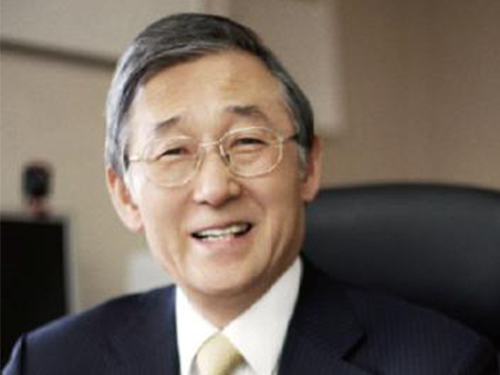 KAIST's Board of Trustees Reappoints Dr. Jang-Moo Lee as Chairman
Dr. Jang-Moo Lee, the incumbent Chairman of the KAIST Board of Trustees, has been re-elected to head the office. His term will begin from the date of approval by the Minister of Science, ICT and Future Planning of Korea and will last for three years.
Dr. Lee received his undergraduate and master’s degrees in mechanical engineering from Seoul National University. He later earned his doctoral degree in mechanical engineering from Iowa State University in the United States.
Joined the faculty of his alma mater in 1976, Dr. Lee held various posts within the university including the dean of the engineering college. He served as the president of the Association of Korean Engineering Colleges, the founding chairman of the Korea Evaluation Institute of Industrial Technology, the president of the Korean Society of Mechanical Engineers, the 24th president of Seoul National University, and the 13th president of the Korean Council for University Education. He now serves as the president of the National Science and Technology Council of Korea and the chairman of Climate Change Center’s Board of Directors.
Dr. Lee has received numerous honors and awards, among others, the Academic Award of the Korean Society of Mechanical Engineers (1985), the Order of Science and Technology Merit from the Korean government (2005), the National Academy of Sciences Award (2005), and the Order of Service Merit in Blue Stripes (2010) from the Korean government. He was also selected as the Alma Mater Proud from Kyunggi High School in 2011.
2016.12.15 View 4613
KAIST's Board of Trustees Reappoints Dr. Jang-Moo Lee as Chairman
Dr. Jang-Moo Lee, the incumbent Chairman of the KAIST Board of Trustees, has been re-elected to head the office. His term will begin from the date of approval by the Minister of Science, ICT and Future Planning of Korea and will last for three years.
Dr. Lee received his undergraduate and master’s degrees in mechanical engineering from Seoul National University. He later earned his doctoral degree in mechanical engineering from Iowa State University in the United States.
Joined the faculty of his alma mater in 1976, Dr. Lee held various posts within the university including the dean of the engineering college. He served as the president of the Association of Korean Engineering Colleges, the founding chairman of the Korea Evaluation Institute of Industrial Technology, the president of the Korean Society of Mechanical Engineers, the 24th president of Seoul National University, and the 13th president of the Korean Council for University Education. He now serves as the president of the National Science and Technology Council of Korea and the chairman of Climate Change Center’s Board of Directors.
Dr. Lee has received numerous honors and awards, among others, the Academic Award of the Korean Society of Mechanical Engineers (1985), the Order of Science and Technology Merit from the Korean government (2005), the National Academy of Sciences Award (2005), and the Order of Service Merit in Blue Stripes (2010) from the Korean government. He was also selected as the Alma Mater Proud from Kyunggi High School in 2011.
2016.12.15 View 4613 -
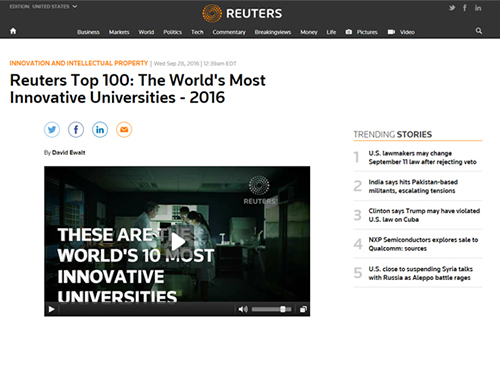 KAIST Ranked the World's Sixth Most Innovative University
KAIST took sixth place in the list of “The World’s Top 100 Most Innovative Universities.” Thomson Reuters released the list on September 28, 2016, which was based on the data compiled by its division of Intellectual Property & Science such as patent filings, number of research papers and their citations, and industry collaboration. American universities took ranks from first to fifth; KAIST was the only non-American university that ranked highest in the list. Stressing the importance of linking basic research with commercializing efforts, Thomson Reuters said, the listed universities were “doing the most to advance science, invent new technologies and help drive the global economy.”
For details, go to the link below:
Reuters Top 100: The World’s Most Innovative Universities-2016
September 28, 2016
http://www.reuters.com/article/amers-reuters-ranking-innovative-univers-idUSL2N1C406D
2016.09.29 View 6372
KAIST Ranked the World's Sixth Most Innovative University
KAIST took sixth place in the list of “The World’s Top 100 Most Innovative Universities.” Thomson Reuters released the list on September 28, 2016, which was based on the data compiled by its division of Intellectual Property & Science such as patent filings, number of research papers and their citations, and industry collaboration. American universities took ranks from first to fifth; KAIST was the only non-American university that ranked highest in the list. Stressing the importance of linking basic research with commercializing efforts, Thomson Reuters said, the listed universities were “doing the most to advance science, invent new technologies and help drive the global economy.”
For details, go to the link below:
Reuters Top 100: The World’s Most Innovative Universities-2016
September 28, 2016
http://www.reuters.com/article/amers-reuters-ranking-innovative-univers-idUSL2N1C406D
2016.09.29 View 6372 -
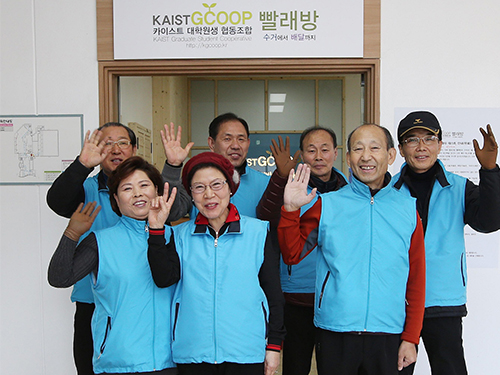 KAIST Opens a Campus Laundromat
The young and older generations are cooperating to create work places for the local elderly.
The KAIST Graduate Association and the Korean Labor Force Development Institute for the Aged (KORDI) held an opening ceremony for a campus laundromat on January 26, 2016 at the multi-purpose hall of the International Center.
The newly-opened laundromat has two large washing machines, two front-loading washers, and two large dryers that can handle up to 400 kg of laundry.
The KAIST Graduate Association asked KORDI to operate the laundromat to offer job opportunities to seniors in the local community, while providing KAIST students with more conveniences in campus life. As a result, ten seniors are working at the laundromat, providing a variety of cleaning services.
Chan Park, President of the KAIST Graduate Association, said, “I have been contemplating ways in which universities can cooperate with the local community. I hope this particular business model will make a modest improvement in the creation of jobs for the elderly.”
2016.01.26 View 4553
KAIST Opens a Campus Laundromat
The young and older generations are cooperating to create work places for the local elderly.
The KAIST Graduate Association and the Korean Labor Force Development Institute for the Aged (KORDI) held an opening ceremony for a campus laundromat on January 26, 2016 at the multi-purpose hall of the International Center.
The newly-opened laundromat has two large washing machines, two front-loading washers, and two large dryers that can handle up to 400 kg of laundry.
The KAIST Graduate Association asked KORDI to operate the laundromat to offer job opportunities to seniors in the local community, while providing KAIST students with more conveniences in campus life. As a result, ten seniors are working at the laundromat, providing a variety of cleaning services.
Chan Park, President of the KAIST Graduate Association, said, “I have been contemplating ways in which universities can cooperate with the local community. I hope this particular business model will make a modest improvement in the creation of jobs for the elderly.”
2016.01.26 View 4553 -
 Visit by Danish Folk High School: Vallekilde Højskole
A group of 60 Danish students and teachers from Vallekilde Højskole, one of 70 Folk High Schools that are spread across Denmark, visited KAIST on October 16, 2015.
The Danish delegation and KAIST’s student organization, the International Conference for the Integration of Science, Technology, and Society (ICISTS), jointly ran a conference entitled “Learning through Having Fun and Games.”
At the conference, the Headmaster of Game Academy at Vallekilde Højskole, Thomas Vigild, gave a lecture on how Vallekilde Folk High School is educating new generations with play, curiosity, and collaboration.
During the conference, KAIST and Danish students held an event called the PlayShop, which was hosted by Headmaster Vigild. At the PlayShop, some 80 students from both institutions enjoyed Danish folk games and shared cross-cultural experiences.
The Danish Folk High School, which dates back to 1844 when its first school opened in Southern Denmark, started as a civic school offering equal learning opportunities to people less fortunate to receive a regular education.
Today, the Folk High School has grown into life-long educational institutions that provide Danish citizens from high school students to seniors with alternative, complementary education that allows citizens to venture out into new fields of their interest or further hone their professional skills and knowledge.
Established in 1865, the Vallekilde Folk High School specializes in journalism, game development, event management, literature, crafts, youth leadership, music and design. Its game development classes at the Game Academy are known for helping students reach their potential through learning from fun games, creative initiatives, and collaborative projects.
The invitation of the Danish school was made possible by Director Heekyung Park of the Institute of Disaster Studies at KAIST.
Director Park said,
“In a sense, I could say that all Danish Folk High Schools are an ideal form of delivering education. They pursue ways to teach students without losing their curiosity and interest in subjects. The schools remove any type of exams from classrooms, while striving to ensure the maximum participation of students in the learning process. KAIST could emulate some of these educational practices to offer its students a classroom free of stress and full of inspirations.”
The Danish delegation toured KAIST’s Humanoid Research Center and the Urban Robotics Lab after the conference.
2015.10.16 View 6477
Visit by Danish Folk High School: Vallekilde Højskole
A group of 60 Danish students and teachers from Vallekilde Højskole, one of 70 Folk High Schools that are spread across Denmark, visited KAIST on October 16, 2015.
The Danish delegation and KAIST’s student organization, the International Conference for the Integration of Science, Technology, and Society (ICISTS), jointly ran a conference entitled “Learning through Having Fun and Games.”
At the conference, the Headmaster of Game Academy at Vallekilde Højskole, Thomas Vigild, gave a lecture on how Vallekilde Folk High School is educating new generations with play, curiosity, and collaboration.
During the conference, KAIST and Danish students held an event called the PlayShop, which was hosted by Headmaster Vigild. At the PlayShop, some 80 students from both institutions enjoyed Danish folk games and shared cross-cultural experiences.
The Danish Folk High School, which dates back to 1844 when its first school opened in Southern Denmark, started as a civic school offering equal learning opportunities to people less fortunate to receive a regular education.
Today, the Folk High School has grown into life-long educational institutions that provide Danish citizens from high school students to seniors with alternative, complementary education that allows citizens to venture out into new fields of their interest or further hone their professional skills and knowledge.
Established in 1865, the Vallekilde Folk High School specializes in journalism, game development, event management, literature, crafts, youth leadership, music and design. Its game development classes at the Game Academy are known for helping students reach their potential through learning from fun games, creative initiatives, and collaborative projects.
The invitation of the Danish school was made possible by Director Heekyung Park of the Institute of Disaster Studies at KAIST.
Director Park said,
“In a sense, I could say that all Danish Folk High Schools are an ideal form of delivering education. They pursue ways to teach students without losing their curiosity and interest in subjects. The schools remove any type of exams from classrooms, while striving to ensure the maximum participation of students in the learning process. KAIST could emulate some of these educational practices to offer its students a classroom free of stress and full of inspirations.”
The Danish delegation toured KAIST’s Humanoid Research Center and the Urban Robotics Lab after the conference.
2015.10.16 View 6477 -
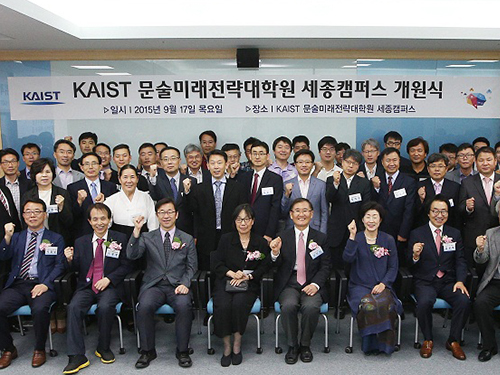 Moon Soul Graduate School of Future Strategy at KAIST Creates the Next Generation Open Forum 2045
Open forums for envisioning the next 30 years for Korea from the perspective of young people will be held in five metropolitan cities in Korea. Organized by KAIST and hosted by the Ministry of Science, ICT and Future Planning and the Committee for the 70th Anniversary of Korean Liberation, the Next Generation Open Forum 2045 invites young people to shape the future image of Korea for the upcoming 100th anniversary of Korean liberation. It will start off with its first event on September 22 in the Millennium Hall of Konkuk University in Seoul.
In this event, a panel and invited guests will discuss employment issues with a view to ameliorating problems prevalent in the society. A robotics scientist, Dr. JK Han will address the impact of robot automation on the job issue as a keynote speaker, and a performance featuring human-size robot actor will follow his talk to celebrate the opening of the event.
Invited guests can actively participate in the discussion by suggesting their opinions on job issue of the future and by voting on their smartphone apps during the event. Every opinion conveyed during the discussion will be printed and put in a time capsule, which will be opened in 2045 for the celebration of 100th anniversary of Korean liberation.
The Moon Soul Graduate School of Future Strategy of KAIST will organize events in five cities including Daegu, Daejeon, Busan, and Gwangju with topics including education, science and technology, unification diplomacy, and culture. The event will end with a symposium held in Seoul. Perspective applicants can apply for free to the Next Generation Open Forum 2045 on the official website of the Committee for the 70th Anniversary of Korean Liberation.
2015.09.22 View 5598
Moon Soul Graduate School of Future Strategy at KAIST Creates the Next Generation Open Forum 2045
Open forums for envisioning the next 30 years for Korea from the perspective of young people will be held in five metropolitan cities in Korea. Organized by KAIST and hosted by the Ministry of Science, ICT and Future Planning and the Committee for the 70th Anniversary of Korean Liberation, the Next Generation Open Forum 2045 invites young people to shape the future image of Korea for the upcoming 100th anniversary of Korean liberation. It will start off with its first event on September 22 in the Millennium Hall of Konkuk University in Seoul.
In this event, a panel and invited guests will discuss employment issues with a view to ameliorating problems prevalent in the society. A robotics scientist, Dr. JK Han will address the impact of robot automation on the job issue as a keynote speaker, and a performance featuring human-size robot actor will follow his talk to celebrate the opening of the event.
Invited guests can actively participate in the discussion by suggesting their opinions on job issue of the future and by voting on their smartphone apps during the event. Every opinion conveyed during the discussion will be printed and put in a time capsule, which will be opened in 2045 for the celebration of 100th anniversary of Korean liberation.
The Moon Soul Graduate School of Future Strategy of KAIST will organize events in five cities including Daegu, Daejeon, Busan, and Gwangju with topics including education, science and technology, unification diplomacy, and culture. The event will end with a symposium held in Seoul. Perspective applicants can apply for free to the Next Generation Open Forum 2045 on the official website of the Committee for the 70th Anniversary of Korean Liberation.
2015.09.22 View 5598 -
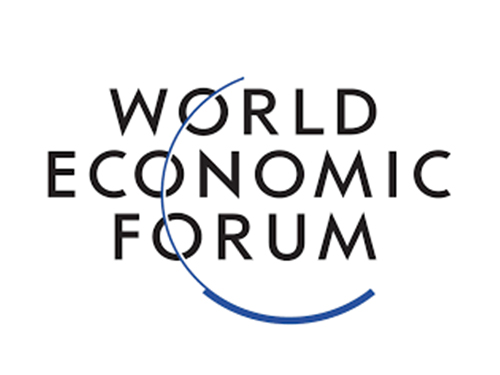 KAIST Participates in the World Economic Forum's Annual Meeting of the New Champions 2015 in China
KAIST’s president and its professors actively engage in discussions of major issues on higher education, technology innovation, and industry-university collaboration with global leaders from across all sectors.
President Steve Kang of KAIST participated in the Annual Meeting of the New Champions 2015 (a.k.a., Summer Davos Forum) hosted by the World Economic Forum (WEF). With the theme of “Charting a New Course for Growth,” the Summer Davos Forum took place on September 9-11, 2015 in, Dalian, China.
Currently, KAIST is a member of the Global University Leaders Forum (GULF) of WEF, a gathering of the presidents of the top 25 universities in the world, including Harvard University, Massachusetts Institute of Technology, University of Tokyo, University of Oxford, Peking University, and National University of Singapore. GULF allows university leaders an opportunity to have high-level dialogues on higher education and research and explore prospects for cooperative ventures.
President Kang led the discussion of the GULF session at the Summer Davos Forum, which was held on September 10, 2015, with 25 university leaders as well as two business leaders from Chinese companies: Huawei Technologies Co. Ltd., and Sanofi China. The participants shared candid perspectives on industry-university collaboration, particularly the need for such partnerships in Asia.
In addition, KAIST hosted the fourth IdeasLab session, entitled “Bio versus Nano Materials, on September 9, 2015. At the session, four KAIST professors held an in-depth debate and discussion with the audience on whether the next industrial revolution would be driven by advances in biomaterials or nanomaterials.
The topics under discussion were:
- New materials that mimic biology by Professor Hea Shin Lee
- Bio-based materials that replace petroleum-based materials by Professor Sang Yup Lee
- New materials designed at sub-nano scale by Professor Hee Tae Jung
- A hydrogen economy with nanomaterials by Professor Eun Ae Cho
Since its establishment in 2007, the Summer Davos Forum has become the biggest business and political gathering in Asia, held annually either in Dalian or Tianjin, China. The Forum has attracted more than 1,500 participants primarily from emerging nations such as China, India, Russia, Mexico, and Brazil, and has offered an open platform to address issues important to the region and the global community.
2015.09.14 View 9849
KAIST Participates in the World Economic Forum's Annual Meeting of the New Champions 2015 in China
KAIST’s president and its professors actively engage in discussions of major issues on higher education, technology innovation, and industry-university collaboration with global leaders from across all sectors.
President Steve Kang of KAIST participated in the Annual Meeting of the New Champions 2015 (a.k.a., Summer Davos Forum) hosted by the World Economic Forum (WEF). With the theme of “Charting a New Course for Growth,” the Summer Davos Forum took place on September 9-11, 2015 in, Dalian, China.
Currently, KAIST is a member of the Global University Leaders Forum (GULF) of WEF, a gathering of the presidents of the top 25 universities in the world, including Harvard University, Massachusetts Institute of Technology, University of Tokyo, University of Oxford, Peking University, and National University of Singapore. GULF allows university leaders an opportunity to have high-level dialogues on higher education and research and explore prospects for cooperative ventures.
President Kang led the discussion of the GULF session at the Summer Davos Forum, which was held on September 10, 2015, with 25 university leaders as well as two business leaders from Chinese companies: Huawei Technologies Co. Ltd., and Sanofi China. The participants shared candid perspectives on industry-university collaboration, particularly the need for such partnerships in Asia.
In addition, KAIST hosted the fourth IdeasLab session, entitled “Bio versus Nano Materials, on September 9, 2015. At the session, four KAIST professors held an in-depth debate and discussion with the audience on whether the next industrial revolution would be driven by advances in biomaterials or nanomaterials.
The topics under discussion were:
- New materials that mimic biology by Professor Hea Shin Lee
- Bio-based materials that replace petroleum-based materials by Professor Sang Yup Lee
- New materials designed at sub-nano scale by Professor Hee Tae Jung
- A hydrogen economy with nanomaterials by Professor Eun Ae Cho
Since its establishment in 2007, the Summer Davos Forum has become the biggest business and political gathering in Asia, held annually either in Dalian or Tianjin, China. The Forum has attracted more than 1,500 participants primarily from emerging nations such as China, India, Russia, Mexico, and Brazil, and has offered an open platform to address issues important to the region and the global community.
2015.09.14 View 9849 -
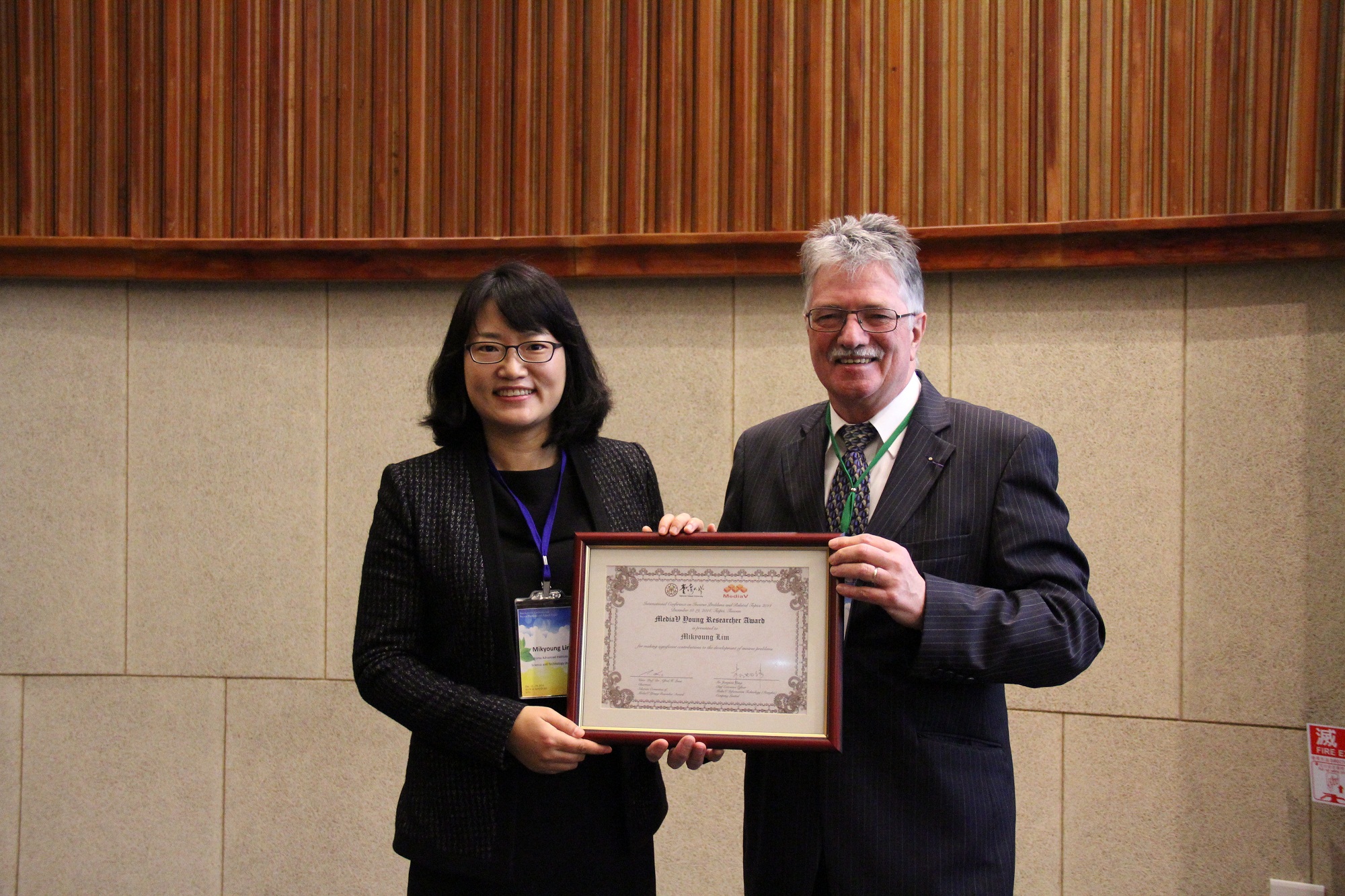 Professor Mikyoung Lim Receives the MediaV Young Researcher Award
Professor Mikyoung Lim of the Department of Mathematical Sciences at KAIST received the MediaV Young Researchers Award at the International Conference on Inverse Problems and Related Topics that took place at the National Taiwan University, Taiwan, on December 15-19, 2014.
The Conference established the MediaV Young Researcher Award in 2010 to recognize distinguished scholars who are age 40 or younger and have made important contributions to the field of inverse problems. This year, two recipients were chosen for the award.
Professor Lim has focused her research on the incremental reading of incomprehensible materials’ imaging and the effect of invisibility cloaking.
The other awardee was Kui Ren, a professor at the University of Texas at Austin.
2014.12.27 View 12773
Professor Mikyoung Lim Receives the MediaV Young Researcher Award
Professor Mikyoung Lim of the Department of Mathematical Sciences at KAIST received the MediaV Young Researchers Award at the International Conference on Inverse Problems and Related Topics that took place at the National Taiwan University, Taiwan, on December 15-19, 2014.
The Conference established the MediaV Young Researcher Award in 2010 to recognize distinguished scholars who are age 40 or younger and have made important contributions to the field of inverse problems. This year, two recipients were chosen for the award.
Professor Lim has focused her research on the incremental reading of incomprehensible materials’ imaging and the effect of invisibility cloaking.
The other awardee was Kui Ren, a professor at the University of Texas at Austin.
2014.12.27 View 12773 -
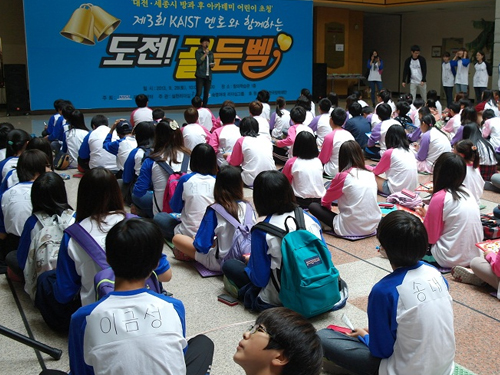 Community Outreach Program by KAIST Students for Underprivileged Children
The KAIST Leadership Executive Team (K-LET), a student volunteer group, hosted an event for children and teenagers who live in the local community. The K-LET invited 120 students in Daejeon and Sejong City on November 1, 2014 and held a quiz game called “Challenge! The Golden Bell” at the Creative Lecture Hall on campus.
The K-LET was created in 2009 by a group of students who wanted to contribute to the betterment of society through volunteer activities such as donating their time to teach math and science to students.
After the game, the participating students toured the campus and met KAIST students. Dong-Wook Lee, the President of K-LET, said, “We hope that the students have enjoyed their time with us, and we will continue to hold this kind of event next year and onwards.”
2014.11.06 View 6317
Community Outreach Program by KAIST Students for Underprivileged Children
The KAIST Leadership Executive Team (K-LET), a student volunteer group, hosted an event for children and teenagers who live in the local community. The K-LET invited 120 students in Daejeon and Sejong City on November 1, 2014 and held a quiz game called “Challenge! The Golden Bell” at the Creative Lecture Hall on campus.
The K-LET was created in 2009 by a group of students who wanted to contribute to the betterment of society through volunteer activities such as donating their time to teach math and science to students.
After the game, the participating students toured the campus and met KAIST students. Dong-Wook Lee, the President of K-LET, said, “We hope that the students have enjoyed their time with us, and we will continue to hold this kind of event next year and onwards.”
2014.11.06 View 6317 -
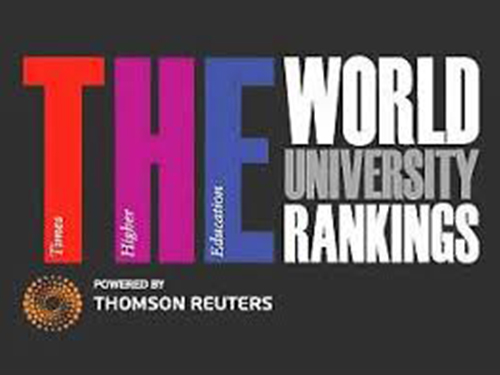 KAIST Ranks 26th in Engineering & Technology and 52nd overall in the Times Higher Education World University Rankings 2014-2015
The 2014-2015 Times Higher Education (THE) World University Rankings were released on October 1, 2014. KAIST took 52nd place in the overall rankings and 26th in the field of engineering and technology.
THE used 13 performance indicators to evaluate universities, grouping them into five areas of teaching, research, citations, industry income, and international outlook.
In recent years, KAIST has seen steady improvements in areas of research, citations, and international outlook. In addition to KAIST, two Korean universities, Seoul National University (50th) and Pohang University of Science and Technology (66th), were included within the top 100 universities.
For details, please visit:
http://www.timeshighereducation.co.uk/world-university-rankings/2014-15/world-ranking.
2014.10.03 View 9469
KAIST Ranks 26th in Engineering & Technology and 52nd overall in the Times Higher Education World University Rankings 2014-2015
The 2014-2015 Times Higher Education (THE) World University Rankings were released on October 1, 2014. KAIST took 52nd place in the overall rankings and 26th in the field of engineering and technology.
THE used 13 performance indicators to evaluate universities, grouping them into five areas of teaching, research, citations, industry income, and international outlook.
In recent years, KAIST has seen steady improvements in areas of research, citations, and international outlook. In addition to KAIST, two Korean universities, Seoul National University (50th) and Pohang University of Science and Technology (66th), were included within the top 100 universities.
For details, please visit:
http://www.timeshighereducation.co.uk/world-university-rankings/2014-15/world-ranking.
2014.10.03 View 9469 -
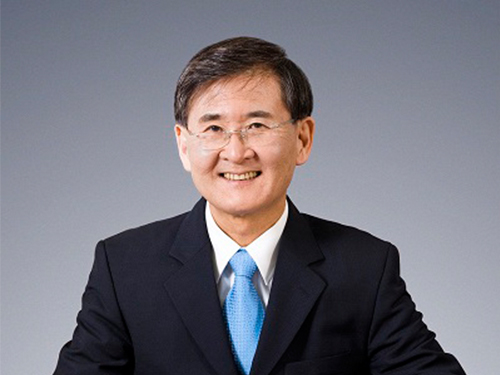 President Steve Kang of KAIST Attends the 2014 Summer Davos Forum in Tianjin, China
President Steve Kang of KAIST will attend the 2014 Annual Meeting of the New Champions, the World Economic Forum (WEF), to be held on September 10-12, 2014 in Tianjin, China.
KAIST holds its own IdeasLab session on nanotechnology on September 12, 2014.
On September 10, 2014, President Steve Kang will participate in a private session hosted by the Global University Leaders Forum (GULF) community at WEF as a panelist.
In addition to President Kang, eight presidents from top global universities such as the National University of Singapore, Peking University, ETH Zurich (Swiss Federal Institute of Technology), University of Tokyo, and Carnegie Mellon University will join the panel discussion under the topic, “Increasing the Translational Impact of University Research.” Specifically, the presidents will address issues related to the importance of university-led technology transfer in Asia, key strategies and goals for technology transfer, and implementation approaches taken by each university to promote technology transfer from university to industry.
President Kang was invited to this GULF session, the only attendant from Korean universities, in recognition of his long time experience and expertise in education and research.
In 2006, WEF created the GULF, a small community of the presidents of top universities in the world, aiming to offer an open platform for high-level dialogues on issues of higher education and research with other sectors, as well as to foster collaboration between universities in areas of significance for global policy.
As of 2014, a total of 25 globally leading universities, including Harvard University, University of Cambridge, and Massachusetts Institute of Technology, are GULF members. KAIST, which joined the club this year, is the only Korean university.
The 2014 Annual Meeting of the New Champions, also known as the Summer Davos Forum, hosts numerous sessions under the theme of “Creating Value through Innovation.” At the Forum, a total of ten IdeasLab sessions will be hosted. KAIST was invited to run its own IdeasLab on nanotechnology on September 12, 2014.
Together with President Kang, Professors Sang Ouk Kim and Keon Jae Lee from the Department of Materials Science Engineering, KAIST, and Professors Sang Yup Lee and Hyunjoo Lee from the Department of Chemical and Biomolecular Engineering, KAIST, will present their own speeches on the topic entitled “From diagnostics to materials, how is nanotechnology changing lives?”
President Kang will give the opening speech at the KAIST IdeasLab.
He said that an invitation from WEF to join the IdeasLab spoke well for KAIST:
“KAIST is the first and the only Korean university ever invited to run its own IdeasLab at the World Economic Forum. The IdeasLab is an expert group meeting, conducted only by the world’s most prestigious universities and research institutes. At the IdeasLab sessions, global leaders from different sectors identify major issues facing higher education and humanity and explore solutions through science and technology innovation. Holding our own IdeasLab on one of our strongest fields, nanotechnology, is indeed an excellent opportunity for KAIST to show its strength in academic and research excellence on the global stage.”
2014.09.08 View 16088
President Steve Kang of KAIST Attends the 2014 Summer Davos Forum in Tianjin, China
President Steve Kang of KAIST will attend the 2014 Annual Meeting of the New Champions, the World Economic Forum (WEF), to be held on September 10-12, 2014 in Tianjin, China.
KAIST holds its own IdeasLab session on nanotechnology on September 12, 2014.
On September 10, 2014, President Steve Kang will participate in a private session hosted by the Global University Leaders Forum (GULF) community at WEF as a panelist.
In addition to President Kang, eight presidents from top global universities such as the National University of Singapore, Peking University, ETH Zurich (Swiss Federal Institute of Technology), University of Tokyo, and Carnegie Mellon University will join the panel discussion under the topic, “Increasing the Translational Impact of University Research.” Specifically, the presidents will address issues related to the importance of university-led technology transfer in Asia, key strategies and goals for technology transfer, and implementation approaches taken by each university to promote technology transfer from university to industry.
President Kang was invited to this GULF session, the only attendant from Korean universities, in recognition of his long time experience and expertise in education and research.
In 2006, WEF created the GULF, a small community of the presidents of top universities in the world, aiming to offer an open platform for high-level dialogues on issues of higher education and research with other sectors, as well as to foster collaboration between universities in areas of significance for global policy.
As of 2014, a total of 25 globally leading universities, including Harvard University, University of Cambridge, and Massachusetts Institute of Technology, are GULF members. KAIST, which joined the club this year, is the only Korean university.
The 2014 Annual Meeting of the New Champions, also known as the Summer Davos Forum, hosts numerous sessions under the theme of “Creating Value through Innovation.” At the Forum, a total of ten IdeasLab sessions will be hosted. KAIST was invited to run its own IdeasLab on nanotechnology on September 12, 2014.
Together with President Kang, Professors Sang Ouk Kim and Keon Jae Lee from the Department of Materials Science Engineering, KAIST, and Professors Sang Yup Lee and Hyunjoo Lee from the Department of Chemical and Biomolecular Engineering, KAIST, will present their own speeches on the topic entitled “From diagnostics to materials, how is nanotechnology changing lives?”
President Kang will give the opening speech at the KAIST IdeasLab.
He said that an invitation from WEF to join the IdeasLab spoke well for KAIST:
“KAIST is the first and the only Korean university ever invited to run its own IdeasLab at the World Economic Forum. The IdeasLab is an expert group meeting, conducted only by the world’s most prestigious universities and research institutes. At the IdeasLab sessions, global leaders from different sectors identify major issues facing higher education and humanity and explore solutions through science and technology innovation. Holding our own IdeasLab on one of our strongest fields, nanotechnology, is indeed an excellent opportunity for KAIST to show its strength in academic and research excellence on the global stage.”
2014.09.08 View 16088